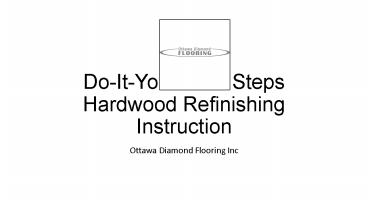Do-It-Yourself 6 Steps Hardwood Refinishing Instruction PowerPoint PPT Presentation
Title: Do-It-Yourself 6 Steps Hardwood Refinishing Instruction
1
Do-It-Yourself 6 Steps Hardwood Refinishing
Instruction
- Ottawa Diamond Flooring Inc
2
- Because of the availability of several home
improvement tips and instructions online, I was
motivated to give some do-it-yourself home
projects a try. Since I think it is already time
for my hardwood flooring to get rewarded with a
facelift, I started my home improvement project
with refinishing. - Before I started with home improvement project, I
tried to ask Google first about hardwood
refinishing Ottawa. After reading a couple of
articles from different websites, I found out
that no single site posted a full list of tips
and instructions on the process of staining. And
so I tried to condense everything that I have
read and made my own list of instructions. Now, I
am sharing with you the complete list that I also
followed in sanding and staining my hardwood
floor.
3
1. Clear out everything from the room
Prior to sanding, you will need to clear out
everything from the room first. If you are using
a carpet, carefully remove it. Like I did, you
will also surely be surprised to see the amount
of sand and dirt hiding underneath your carpet.
Transfer all your stuff and furniture to another
room.
4
2. Take away the shoe molding
- You do not have to take away the baseboards
unless otherwise, you want to replace them.
Before you start, make sure to cover items on
shelving, as well as your light fixtures, vents,
electrical outlets, and switches with plastic and
secure it a masking tape to prevent dust
particles from getting stuck in these items.
Also, attach a plastic drop cloth to any adjacent
door jams so that the clouds of dust particles
will not enter the other rooms. Then clean the
floor by sweeping away dust and particles. And
don't forget to protect yourself as well by
wearing a respirator mask.
5
3. Sand the floor
Although it takes time, sanding the floor is
quite easy. Start in the central part of the room
and then work you way out to the sides. With the
help of a drum sander with no less than 120-grit
sandpaper, sand the floor in sections as well as
in smooth, and slow back-and-forth motions. Be
sure to move with the grain of the wood and avoid
going in circles. Sand the floor until the old
varnish is thoroughly removed and the bare wood
is already visible. But do not stay in one
portion too long because you might also sand
through to the subfloor. If you are already done
with the entire floor, use an edge or hand
sander to sand the portions that can't be reached
by the drum sander.
6
4. Clean up the area
- Sweep or vacuum the floor to remove the particles
then check if the wood is already uniform in
texture and if it feels soft. If everything is
smooth, wipe the entire floor with a clean dry
cloth. Be sure the floor is thoroughly clean
before staining to prevent blotchy and uneven
finish.
7
5. Apply the stain
Open all the doors and windows first before
opening the stain so that you will have a good
ventilation and then wear a pair of disposable
plastic gloves to protect your hand. Thoroughly
shake the stain and pour enough amount into the
paint tray. Apply the stain using a brush and
then go over it using a rag within 5 minutes.
Do it at a consistent speed and be sure that you
follow the wood's grain to avoid streaks from
forming. After staining the entire floor, let it
sit for at least 4 hours and then apply the
second coat and leave it overnight.
8
6. Seal your floor
- The following day, apply an enough amount of
polyurethane using the method you use in
staining. Polyurethane will make your floor extra
shiny and it will as well provide an added
protection. For best result, apply at least three
coats.
9
CONTACT US
- 42 Colonnade Road North
- Ottawa, ON, (ontario)K2E 7J6, Canada
- Tel. 613-274-3535
- http//www.ottawadiamondflooring.com
- info_at_ottawadiamondflooring.com

